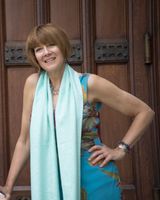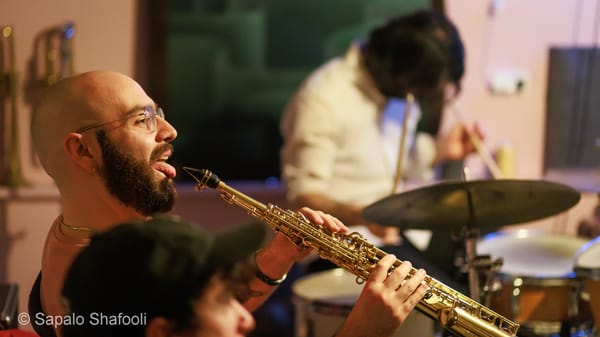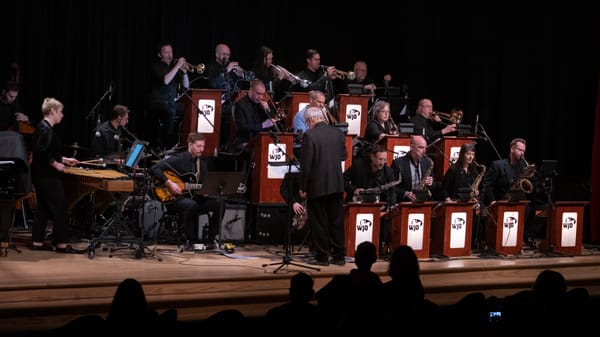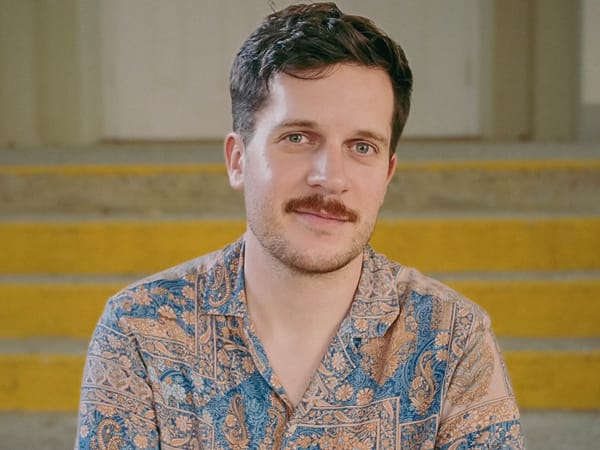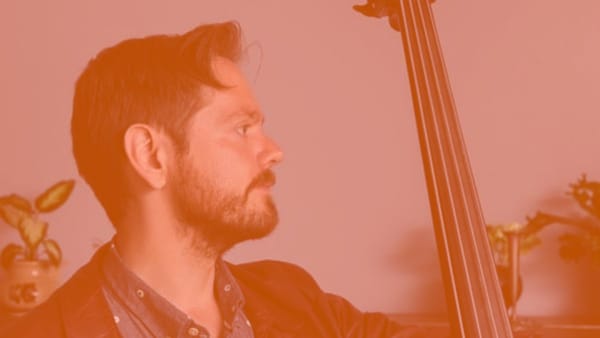Geoff Claridge: clarinet, practice, learning, navigating
"The best thing is that feeling when you have made a difference […] inspired someone."
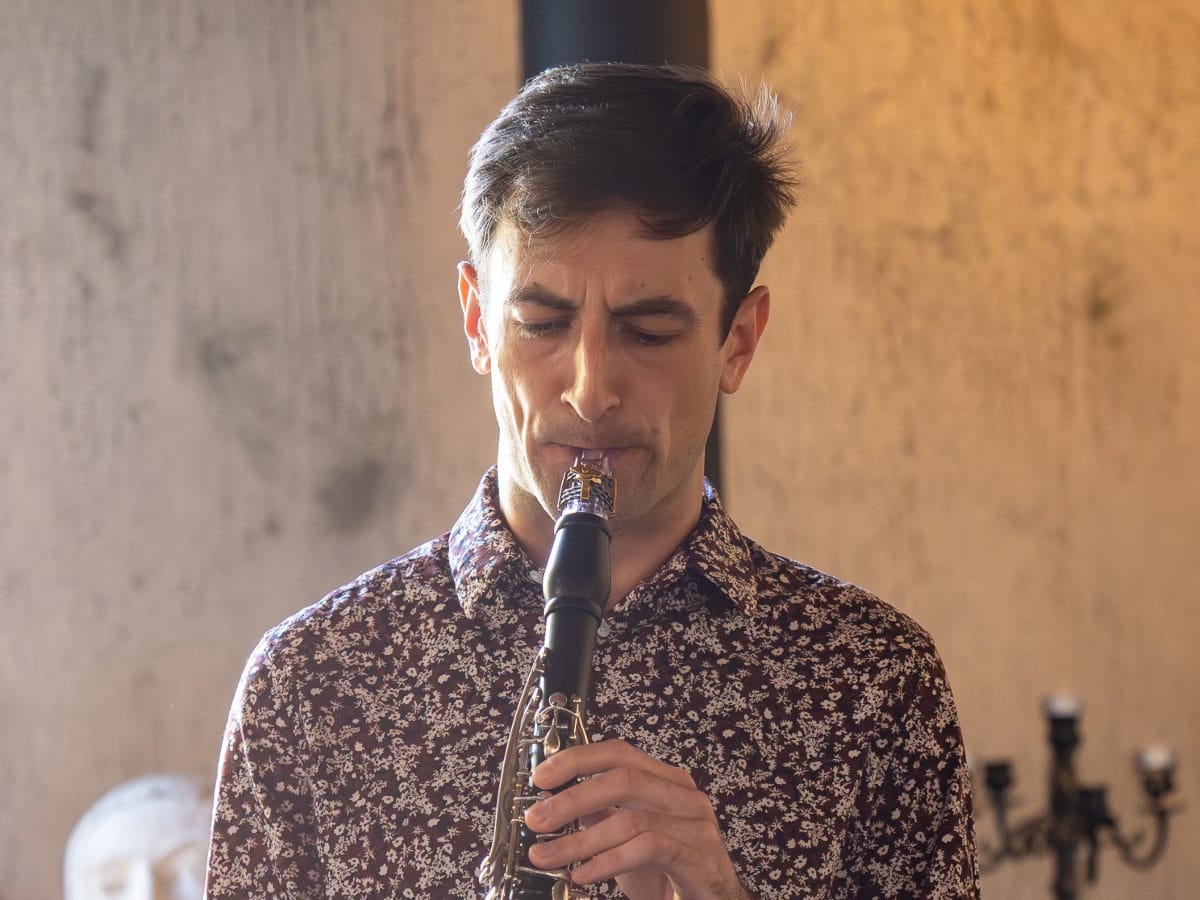
I believe the first time I met and heard Geoff Claridge was when James Danderfer couldn’t make a gig with me. James recommended that I call Geoff, because I wanted someone who could play both clarinet and bass clarinet; imagine my happiness to then get to play with someone as musical and completely delightful as Geoff is. I have been following Geoff’s performing and teaching career, and I continue to be deeply impressed on every level.
In recent months, I've had the privilege to be part of a trio led by Geoff in which guitarist Josh Roberts is also a member. Geoff had carefully, specifically transcribed and charted music by Jimmy Giuffre and had asked me to be a part of the project. I love the music but found it to be overwhelmingly challenging, and in my rehearsal stage with the trio, Geoff was patient, supportive, and always positive even when I was 'cacking' parts. Something about the kindness in Geoff’s demeanor puts me at ease. For someone as high-strung as I know myself to be, it helps me remain settled, determined to not give up on the music.
I still have a lot of work to do before we perform some of the music again later this spring – but for now, more about Geoff. I thought it would be interesting to learn more about Geoff’s musical upbringing. Geoff agreed to do a Q&A with me.
KARIN PLATO: When and where did you first study clarinet, bass clarinet, and saxophone?
GEOFF CLARIDGE. I started the clarinet in grade 4 at my elementary school. They had an amazing teacher in Mr. Don Grant, but I hated it at the start! Trumpet was my second instrument in grade 9 jazz band, since the clarinet was not really allowed and I had no desire to even try the saxophone. The following year, I caved and switched from trumpet to saxophone right when I started taking clarinet lessons with Tom Colclough. Honestly I can’t remember when I first played the bass clarinet, maybe 2012.
KP: Do you play other instruments?
GC: I dabble in the flute. It comes up as a double from time to time, but I’ve never been confident enough to bring it to a jam session. All the other main band instruments I have to know how to play as a teacher, but I don’t think I’ll ever be performing in public on them.
KP: When you compose or arrange music, do you do it on paper, software, using piano, or another chordal instrument?
GC: Sibelius is what I print music on, but I think I prefer paper and pencil when trying to get ideas. The piano is usually the best thing for me if I’m composing something with complex harmonies, but if it’s something I intend to play myself on clarinet, it’s sometimes better to sing an idea or have the clarinet in hand. The recording feature on my phone or iPad has helped me out many times, just recording a quick clip of an idea on clarinet or sax, and I can hear how I meant to play it, not just the notes.
KP: Regarding practicing music, what do you think is the ideal practice regime, and what should that entail for you or for your students?
GC: I don’t have a good answer for this. I think a lot of professionals wish they were more patient when they were younger, that they could have learned ‘the right way’ and with fewer bad habits. Seeing and working with very young kids all the time now, I think the best way is with whatever they’re really interested in. Today I photocopied the theme song to some anime I’d never heard of for one student, after which another came up to me and asked for the same piece but on alto. Great, practice that!
I think it was movie themes like Duel of the Fates from Star Wars when I was their age. Anything that gets you into the practice room, do that to start, but focus. Try to play each note evenly, use a metronome and tuner, they’re the same app for me. Play it at multiple speeds, record yourself, and be honest when you’re listening back. When you’re younger, make it fun and learn patience slowly.
Honestly, the hardest part about learning music is probably the patience it takes to keep practicing, and focusing on the finer points of what you’re practicing more and more. I tell my young students the most important thing is listening. Maybe that’s the short answer.
KP: Are there genres other than jazz you enjoy playing or listening to?
GC: Austrian Polka music, anyone? Check out Global Kryner, a now defunct band led by a clarinetist, comedian, arranger who plays pop music with a lot of comedy, but also really good arrangements.
I try to listen to more classical music when I can but not on a regular basis, in particular Prokofiev, one of Eddie Sauter’s earlier influences; and Debussy, Jimmy Giuffre’s [influence].
Last year I was checking out a few video game composers whose music my students liked. Lena Raine came up from their work with Minecraft.
I know I should listen to more Bulgarian and klezmer music, lots of clarinet! It keeps coming up in my mind, so maybe that’s next.
KP: Can you name some favourite artists/recordings you are inspired by?
GC: A few that come to mind that really inspired me when I was younger, and continue to! Fred Hersch [Trio] Live at the Village Vanguard, Cannonball and Gil Evans: New Bottle Old Wine, Chris Gestrin: Times that Do Not Belong to Us, Yusef Lateef: Eastern Sounds, Susanne Abbuehl: Compass. Benny Goodman has always been my favourite, perhaps check out "Moonlight on the Ganges".
KP: Is sight-reading an easy skill for you? Is playing by ear easier, or more challenging?
GC: I have definitely worked on my sight reading a lot, so it’s easier now. Out of everything you need to work on to be a professional musician, sight reading might be the easiest, since it’s right in front of you on your music stand. It just takes time.
Playing by ear is a much harder skill to learn in my mind, but it’s a lot of fun trying to play along to recordings. Some, almost all, of the Benny Goodman music I wanted to play when I started playing jazz wasn’t available anywhere, so my best bet was just trying to learn the melodies and a bit of Benny, Teddy, and Lionel’s playing styles by playing along with them. That kind of playing by ear can be a lot of fun, but trying to actually transcribe every note, rhythm, and harmony takes a lot more focus. Maybe the answer depends on how critical you are with your practice. Whatever you can do to enjoy the process and the challenge of it all helps immensely.
KP: What traits do you look for when assembling ensembles to make music with?
GC: Only three things, in no order, they're all equal. How good a musician they are at the music I want them to play; how well they work with the other musicians I've already hired, which is vital with bassists or drummers, if I hire the drummer first I will look for a bassist who I know works really well with them; and how dedicated I think they will be with this music. Which doesn't mean they've practiced it for five hours, but they have looked at the music in advance, decided how much they needed to work on it, and come prepared for the rehearsal and performance. Perhaps I am missing something that should also be there...
I don’t try to [only] hire friends, although their dedication and friendship may be correlated somehow. Playing with people you are close and good friends with seems to be really important to some people, and I can understand why. You play better with people you know intimately. I love Elvin Jones’ quote about Coltrane’s band sounding so good because they all were ready to die for him, the real quote you might not want to print. I certainly want that intimacy, focus and dedication musically with the rest of my band, but maybe for me it involves less late nights, hangovers, and smoking. I still don’t smoke, always felt that was a weird issue in some cultures.
KP: Are there certain activities or rituals you have that fuel your creativity in playing and writing music?
GC: I guess I try to be creative. Hiking, writing poetry, miniature painting, video and board games, a good TV series, and more recently trying to write basic soundtrack-ish things on Cubase with artificial instruments I’ll never learn how to play well is all very inspiring. Treating music as a professional business can be a challenge. Sometimes I just need to be released into the wilderness and then come back with something new to write about.
KP: What are some of the important things you remember being told by some music teacher or mentor that has impacted you and stayed with you?
GC: I went to as many clinics and masterclasses I could as a kid, from high school music festivals to the ones at Cap and the jazz festival each year. Some of the key points were said by almost everyone, so I don’t think I can attribute them to just one person.
I was told that even the jazz legends in NY make at least half of their income teaching, so I knew I had to watch my teachers and leaders very carefully so that I can pass this information on in my own time, like their teachers did for them. Finding your own creative voice takes time, and you should not be afraid of trying to sound like the masters who came before you. That's how they learned from their influences, and no matter how hard you try you will never sound exactly like one musician. Be patient! You will find your own voice in time).
From my lessons with him, Tom Colclough’s approach to learning a difficult passage, very slowly, even 8ths, exaggerated swing, exaggerated anti-swing, has always stuck with me. Also music as a business as opposed to a hobby was kind of mentioned by many, but I think Marianne Trudel demonstrated it best. I'm almost positive it was her, and at Port Townsend. She talked about how she can’t really just play music for her own fun or enjoyment, because she always analyses what she’s playing. It’s always dedicated practice, and therefore mental work. However, at someone’s insistence, she said she would play a bunch of random notes in no particular rhythm or order, and then she demonstrated it: just a bunch of random notes all at a lukewarm dynamic. Her head was up in the air, and I think she was smiling. You can argue that even with that, what you’ve just played may influence what you’re about to play, but that’s the closest way in her mind that she can just play music as a hobby, just listening to those sounds and not trying to analyze it.
KP: Do you prefer a particular instrument from your arsenal or are they all equal for you?
GC: Clarinet, no question. Bass clarinets have a great sound but they aren’t made with the same consistency from note to note, being so much larger and their mechanisms more complicated, so I can’t even put them in the same boat.
KP: What are some of the positive things about being a music teacher in the school system?
GC: The Christmas presents! I didn’t finish all the Starbucks gift cards from last year before I got a new card. The best thing, though, is that feeling when you have made a difference and really inspired someone. It comes and goes, and there’s no way to judge any of it for many years to come. I barely remember anything about my first music teacher and what he taught me on clarinet – probably a lot of bad habits! – but I do remember his passion for Gilbert and Sullivan, and just that excitement and fondness for music, despite the class’ antics I’m sure.
KP: When did you first discover the music of Jimmy Giuffre and when did you do all the transcribing of his various recordings?
GC: I think I stumbled on that first Giuffre 3 album in the mid 2000’s at HMV downtown - I might have known his song "Four Brothers" before that, but I did know Jim Hall’s name, and this was a clarinetist playing with him! I transcribed about 18 of those songs in the span of three weeks in September 2013 on the Sapphire Princess when I was given a single cabin – very rare! – and had hired Emma Postl and Bill Coon to play some of the music the following month. Deadlines are amazing sometimes. I got the music done in time, even if I didn’t have a good bass clarinet for the first couple of gigs.
KP: With respect to how you view these qualities, could you put this list into an order of importance, starting with the most important: time feel, tonal quality, technical ability, improvisational ability, note reading ability, intonation.
GC: I don’t think I have a good answer even for my own opinion of that, although I think tonal quality comes first to me. One of the things I’d love to learn more about is if there are any statistics about what people listen to first when they’re hearing a song for the first time. So many people, not necessarily musicians, listen to the lyrics first, and I listen to lyrics last. I remember some of my teachers at Cap saying rhythm is the first and most important element of music. Whether technique, rhythm, intonation, or creativity matters more to the listener, I’m interested in [that]. To me, it might depend on my mood.
KP: What platforms do you use to listen to music? CD, Vinyl, Streaming?
GC: CD in the car, which is very handy to revisit my old collection. More and more it’s streaming, as even the vinyl Benny Goodman live recordings I have from 1937 are all on YouTube and I don’t have good speakers.
KP: Do you have any special projects, gigs, or recordings coming up in 2024?
GC: Hopefully with you! I keep putting off my own projects, but I really want to do more Giuffre 3 music and record it this year with you and Josh, only if it’s an album it should be originals in that style, once we feel really comfortable with that.
I’ve had enough music ready for a second album with my modern quartet since 2016 but keep putting it off, either because of money or patience, i.e. procrastination, in thinking that I could better arrange each song if I give myself more time. I’m trying to teach the blues to my elementary students right now, and B.B. King’s "Early in the Morning" is coming to mind: just keep waking up with the rising sun, and make the most of it.
